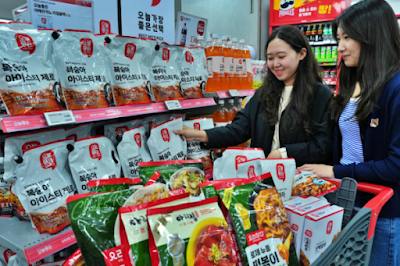 |
| Quality over Price in private label products in Korea |
Private Brand (PB) Products Shift Focus from Price to Quality
As inflation drives fierce "ultra-low price discount competition" in the distribution industry, companies are increasingly focusing on enhancing the product quality of their private brands (PB) rather than merely competing on price. This shift aims to increase customer loyalty by offering differentiated quality that meets long-term demand rather than engaging in price wars.
Customers shopping Lotte Mart's PB products
Lotte Mart and Supermarket's 'Today Good' Brand
According to the distribution industry, Lotte Mart and Supermarket's PB brand 'Today Good' has expanded its product range to over 500 items as of May, a fivefold increase within a year of its launch. Out of 200 product categories, 22 have become best-sellers, demonstrating the brand's strong product quality. Consequently, Lotte Mart's overall PB product sales increased by 15% last year compared to the previous year. Additionally, 'Today Good' and another PB brand, 'Yorihada,' have gained international recognition. On May 15, these two brands won gold medals at the '2024 Monde Selection' in Brussels, Belgium. Lotte Mart plans to continue introducing new high-quality products under the 'Today Good' brand.

Green Village's PB items
Green Village Enhances Organic Ready-to-Eat PB Line

Green Village, an eco-friendly organic shopping mall, is strengthening its ready-to-eat PB line this year, focusing on taste and safety improvements. According to Green Village, over 90% of their currently sold products are PB items. To cater to their primary consumer group, women aged 40-49, they plan to enhance PB competitiveness. They intend to launch over 10 new ready-to-eat PB products in the first half of this year alone. Recently, they rebranded the manufacturer-branded (NB) 'Soy Milk' as a PB product, elevating it to '100% domestic organic' for an enhanced eco-friendly standard.
Kurly to Launch New Home-Cooked Concept PB
Early morning delivery service Kurly has announced plans to launch a new home-cooked concept PB in the latter half of this year. Kurly currently offers various PB lines, including the food PB 'KF365 (Kurly Fresh 365),' non-food PB 'KS365 (Kurly Safe 365),' premium PB 'Kurly's,' and value-oriented PB '99 Series.' The 99 Series, priced at 9,900 KRW, surpassed 900,000 sales in just 16 months. On average, 57,000 units are sold monthly, equating to 2,000 units daily. Last year, 8 out of Kurly's top 10 single-product sales were PB items, indicating high product quality and growing customer loyalty.
Convenience Stores Improve PB Quality
Convenience stores, where PB competition is particularly fierce, are also focusing on quality improvements. Seven-Eleven plans to renew its PB cup coffee, first launched in 2018, for the first time in 7 years. They will upgrade the products to premium by increasing the ingredient content. For example, the milk content in four types of cup coffee, including café latte, will be increased by more than 50%. Additionally, the coffee extract in Americano will be increased by 0.5 times compared to the current level. This responds to the growing premium coffee market and sophisticated consumer tastes. Seven-Eleven also plans to apply its premium PB strategy to other product categories soon.
Changing Consumer Demands Drive PB Product Quality Improvements
The move to enhance PB product quality across the distribution industry is driven by changing consumer demands. While low-priced PB products sold well in the past, the market has grown, and more customers now prioritize quality and trends. The consensus in the industry is that offering specialized PB products that meet these demands will increase customer loyalty. According to the Korea Chamber of Commerce and Industry, the domestic PB product market size grew by 11.8% from the fourth quarter of 2022 to the third quarter of last year. A distribution industry official stated, "Ultra-low price products are helpful for attracting new customers in the current high inflation economy, but in the long run, building loyal customers depends on product competitiveness."

Comments
Post a Comment